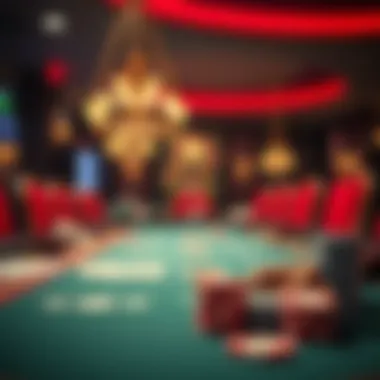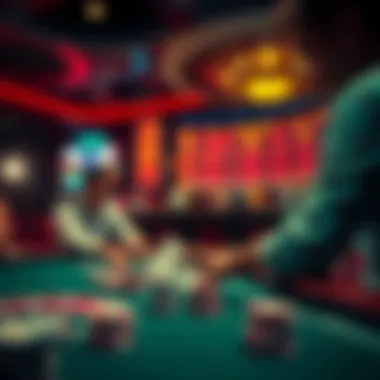Understanding Payouts: Analyzing 1000 to 1 Odds


Intro
In the world of gambling, understanding payouts can be as vital as counting cards in blackjack. When we talk about odds, especially those steep figures like 1000 to 1, it’s essential to grasp not only what they mean but how they shape the gambling landscape itself. Such odds might seem enticing, promising astronomical returns, yet they often mask the realities and risks involved. This article will dissect the intricacies of these high-stakes odds, touch on the rules of various games, and arm you with strategies to navigate the thrilling yet often deceptive terrain of gambling.
From the fabled roulette wheel to the intense world of poker, every game has its unique set of rules and dynamics that influences how odds are calculated and payouts are determined. Understanding these game mechanics lays the foundation for developing effective strategies that maximize your chances of winning.
But it doesn’t stop there. The psychology of gambling, especially when it comes to high-odds bets, is just as important. With the right insights, players can develop a keen sense of when to play it safe and when to bet big — or not at all.
As we delve into the realm of 1000 to 1 odds, we will explore not just the mechanics at play, but also the cultural trends that have shaped gambling behavior over time. By the end of this guide, whether you're a novice or a seasoned expert, you will emerge with a richer understanding of these enticing payouts and how to engage with them responsibly.
Prelude to Odds in Gambling
When stepping into the realm of gambling, understanding odds is as important as knowing the rules of the game itself. Odds serve as the backbone for betting, influencing how players weigh risks against potential rewards. Not all odds are created equal, and differentiating between them can make a significant impact on outcomes. In this section, we will peel back the layers of this often-misunderstood concept, breaking it down to its core components and showing how they’re critical for success in gambling.
Basic Concepts of Betting Odds
To grasp the essence of betting odds, it's vital to comprehend what they represent. Odds essentially tell you how likely an outcome is to happen. They indicate both the probability of an event occurring and how much you can potentially win from your wager. If a bet has odds of 10 to 1, it represents a 10% chance of that event coming through. It’s that simple, but also profoundly complex.
Moreover, these odds structure not just winnings but also the risks that come with betting. Understanding how to interpret these figures is crucial for making informed decisions. Without this knowledge, a player may find themselves flying blind in a sea of uncertainty.
Different Types of Odds Formats
When it comes to format, betting odds can be presented in various ways. Each format has its unique characteristics and advantages, impacting how players analyze their bets.
Fractional Odds
Fractional odds, often seen in the UK betting scene, communicate the profit relative to the stake. A typical expression would be 5/1, meaning for every dollar wagered, you stand to win five if your bet is successful. This format is particularly favored by traditionalists and is easy to calculate.
One appealing aspect of fractional odds is their straightforwardness; you can see at a glance what you might earn. But, they do have their struggles. This format can be less intuitive for players used to decimal systems, which may lead to confusion during calculations.
Decimal Odds
Decimal odds are becoming increasingly popular, especially in online gambling. Unlike fractional odds, decimal values include the initial stake in the calculation. For instance, odds of 6.00 mean a total payout of $6 for every $1 bet, which includes the bet amount itself.
The key benefit here is simplicity. You know exactly how much you get back if your bet is a winner without performing additional mental gymnastics. However, for those enamored by predicting probabilities, decimal odds can take a little of the thrill away by making it too easy to see potential payouts.
Moneyline Odds
Moneyline odds, prevalent in American sports betting, depict the amount you need to bet to win a certain amount—or the payout on a smaller wager. Positive moneyline odds indicate a potential profit on a $100 bet, while negative numbers show how much you need to bet to win $100.
What sets moneyline odds apart is their adaptability. They can quickly show the balance of favor between competitors, making it easier to dabble in sports you may not know well. Despite this flexibility, understanding the nuances can be daunting for newcomers, leading to potential missteps in their betting strategies.
Understanding Probability in Betting
The very foundation of betting is probability. Grasping how likely an event is to happen is essential for informed gambling. Whether you’re betting on the outcome of a game or rolling the dice in a casino, the math is there, lurking in the background. Understanding the probability of various outcomes allows you to make strategic choices, maximizing your chances of success. It’s about reading the numbers—and reading them wisely.
Every player from novice to expert needs to appreciate these fundamentals of probability, as they form the basis from which all betting decisions are made. Without this understanding, players risk chasing after shadows, betting on whims rather than facts.


The Mathematics Behind to Odds
Understanding the mathematics behind high odds is crucial for anyone keen on betting. Specifically, the odds of 1000 to 1 exemplify the kind of long-shot bets that can either yield staggering rewards or deplete one’s bankroll quickly. In this section, we will explore the various aspects of these odds, including how they’re structured, how to make calculations for payouts, and the critical analysis of risks versus rewards involved.
Breaking Down the Odds
When we talk about 1000 to 1 odds, it may seem like a pie in the sky situation. But let’s peel that onion back a bit. Essentially, these odds imply that for every 1001 times an event occurs—and assuming a well-balanced framework—no more than one time will you see a win. Hence, the odds give you a clear picture: the chances of winning are extremely slim, but the potential reward is monumental.
In practice, understanding how these odds work can help gamblers to decipher potential returns against the risks they are willing to take. Moreover, recognizing the arrangement of this ratio can influence decision-making in betting strategies and game selections.
Calculating Potential Payouts
The payout possibilities with 1000 to 1 odds are what draw many gamblers in. However, it’s essential to understand how to calculate these payouts effectively to avoid falling into the traps of wishful thinking.
Initial Bet Amount
The initial bet amount is foundational to your potential payout. If you were to place a bet of, say, $1, your payout if you win would be $1000. This clear relationship between your stake and the potential profit highlights a key characteristic: the more you wager, the more significant the returns. Though the allure of a high return often causes some to overshoot their budgets, it's worth noting that a moderate approach usually yields better results. This way, you minimize losses while still harnessing the excitement these odds provide.
However, there’s often a trade-off between the initial stake and not losing too much should the bet not come through as hoped.
Payout Calculation Formula
To effectively calculate your payout, you’ll rely on a straightforward formula:
[ \textPayout = \textBet Amount \times \textOdds ]
This means, if you bet $10, your payout will be 10 * 1000, which equals $10,000. This formula’s simplicity is a key advantage, as it allows even novice gamblers to quickly grasp their potential returns. This can be especially beneficial in high-pressure environments, like casinos, where clarity is paramount. Yet, it’s crucial to remember that while the formula indicates potential earnings, it does not guarantee them—caution and bankroll management should, therefore, always be kept in mind.
Risk Versus Reward Analysis
With the lure of vast payouts comes the inherent risk of high odds betting. Evaluating this risk versus reward scenario can create a fine balance in your gambling strategy. If one chooses to place a bet at 1000 to 1 odds, there’s an unmistakable chance that one may lose their wager. Thus, examining your risk tolerance is pivotal. Gamblers must weigh whether they are willing to accept the likelihood of a loss against the appealing, albeit improbable, possibility of a significant win. This thoughtful consideration empowers players to make more informed decisions in their betting endeavors and to approach games with a rational frame of mind.
"Betting on long odds is like fishing in deep waters; you might catch a big one, but it also costs you a lot of bait."
Understanding the mathematics behind these odds is not merely about numbers—it's about strategy, emotional control, and approaching the game with an analytical mindset. Embracing this knowledge prepares gamblers to face the realities of high-stakes betting with a clearer perspective.
Practical Applications in Gambling
The realm of gambling is not merely about luck; it demands an understanding that transcends basic gameplay. One critical aspect that brings depth to the betting experience is the practical applications of high odds, particularly 1000 to 1 odds. Grasping how these odds function in different contexts provides gamblers with insights that could be pivotal in their decision-making processes.
Understanding the practical applications offers players a chance to make well-informed bets. By learning how odds like 1000 to 1 manifest in various games, gamblers can identify potential opportunities that others may overlook. Equally important is the assessment of risk versus reward; players begin to appreciate what staking their cash on high odds entails.
Thus, the applicability extends beyond just games—it's about strategies that enable players to navigate the risks involved astutely. This approach positions them to maximize their returns while minimizing the chances of incurring substantial losses. The intricacies of practical applications thus underscore the complexity of betting, enriching the gambling experience as a whole.
Examples of to Odds in Real Games
Sports Betting Scenarios
Sports betting provides an exciting backdrop for 1000 to 1 odds. In the world of sports, particularly when it comes to underdog stories, these odds can come into play when wagering on unlikely outcomes, such as a low-ranked team defeating a champion team in a major tournament. The unpredictability of sports, combined with the excitement of high stakes, makes these scenarios particularly appealing to bettors looking for that jackpot moment.
In particular, the upcoming tournaments often see surprising results, which illustrates why sports betting captures so much interest. The inherent unpredictability means that while the odds might seem far-fetched, there are always factors, such as injuries or weather conditions, that may alter outcomes. Betting on these high odds can offer not only a higher payout but also a fascinating experience, heightened by the replay of emotional storylines.


Nevertheless, the key characteristic of sports betting scenarios lies in their volatility. For all the allure of betting on a long shot, the reality is that these bets are, by nature, high-risk ventures. The potential for reward has to be carefully balanced against the understanding that these outcomes can frequently result in losses.
Casino Games with High Odds
In the casino world, certain games, like lotteries or specific slots, may feature 1000 to 1 odds. Here, the thrill of the unexpected draws players in. Lotteries, for instance, often showcase these odds, which can create excitement amongst players willing to take a gamble on chance.
The charm of these games primarily lies in their simplicity. Players don’t need to comb through statistics or analyze performance trends; it’s all about fair chance and luck. However, this simplicity is a double-edged sword. While the vast payouts can be enticing, the reality is that the odds often favor the house, making it crucial for players to remain vigilant of their spending.
Moreover, the odds add a layer of suspense that can be used strategically, encouraging people to engage in what might otherwise be seen as a mundane bet. Though the odds might seem remote, what keeps players at the table is the thrill of knowing they might just hit the jackpot. Nonetheless, it’s essential to exercise discernment and, where possible, to manage expectations realistically regarding these long shots.
Strategies for Betting on High Odds
Bankroll Management
Kentucky Derby bets or high-stakes slot machines both come with their share of thrill, but without sound bankroll management, even a 1000 to 1 payout can lead to heartbreak. Clever management of one’s finances is crucial for those looking to engage with high odds. Players need to determine a set amount they’re willing to lose, and more importantly, never exceed that amount while betting. This plan serves as a guideline to prevent impulsive decisions that could lead to ire.
The essence of bankroll management is to allow players to sustain their betting lifestyle without devastating consequences. With continuous tracking of winnings and losses, it ensures that the focus remains on strategy rather than purely emotion. On one hand, with high odds betting, the thrill can often cloud judgement, leading to excessive wagering. A clear management plan avoids this scenario, acting as a safety net, helping maintain the integrity of overall gambling experiences.
Game Selection Techniques
High odds necessitate a shrewd approach to game selection. Known for their unpredictability, certain games may better suit a high-odds strategy than others. Sports events that feature underdogs or even jackpot slots can become betting grounds where the 1000 to 1 odds may not just be theoretical. Selecting the right game can elevate the chances of a successful wager instead of adopting a haphazard approach across random settings.
The key to successful game selection involves understanding variance and house edge. Some games, due to their nature, inherently come with lower chances of winning; however, they also provide opportunities for chasing higher payouts. Gamblers must pinpoint which games align with their appetite for risk. Choosing bets wisely while considering their unique characteristics can be the make-or-break factor in achieving a satisfactory gambling journey.
Analyzing Winning Streaks and Their Probability
Winning streaks in gambling, particularly at the level of high odds, warrant nuanced analysis. Streaks can motivate players to consider higher-risk bets on the basis of a perceived trend while often ignoring the underlying statistical probabilities. Understanding how often and why these streaks occur can shape betting decisions in a way that both retains excitement and serves as a sustainability measure for individual gameplay.
Ultimately, breaking down the math behind these streaks allows players to form educated assumptions about when the odds may favor them. These considerations can lead to informed decisions that pivot off the moments of triumph, creating a richer and more fulfilling gambling experience.
Psychological Factors in High-Stakes Betting
The world of high-stakes betting is not just a game of chance and odds; it is a complex interplay of psychological dynamics that influence decisions made at the gambling table. Understanding these psychological factors is critical for both players and those who wish to delve deeper into the mechanisms of betting. These insights can lead to better management of one’s gambling strategy and more informed choices that align with one's risk tolerance.
Understanding Overconfidence in Gamblers
Overconfidence is a common psychological trap that many gamblers, whether novice or experienced, fall into. It often manifests as an inflated belief in one's ability to predict outcomes or win against the odds, particularly in high-stakes scenarios. This can stem from previous wins or perceived expertise, leading players to make bets far exceeding their typical risk thresholds.
For example, a punter who has had a string of luck with similar odds might convince themselves that their system works perfectly, thus ignoring the fundamental probability principles. This overconfidence can result in dramatic losses when the inevitable long-shot goes astray. Gamblers should remain skeptical of their abilities and continuously reassess their betting configurations, rather than getting swept away by short-term success.
The Impact of Chasing Losses
Chasing losses is another perilous habit rooted deeply in gambling psychology. When players experience a loss, the natural instinct may push them to recover those losses as quickly as possible, resulting in riskier bets. This impulse often leads to what is called the "gambler's fallacy," where one believes that past events influence future outcomes in independent games. This might encourage the betting of larger sums in hopes of a significant win that compensates for earlier losses, but the reality is that chasing losses can spiral into a deeper financial hole.
Recognizing this pattern is essential. Players should take breaks, reassess their strategies, and remember that luck is ultimately random. Rather than doubling down with the hope of turning losses into gains, a more measured approach often proves more effective in the long run.
Emotional Decision-Making in Gambling


The role of emotion in gambling cannot be understated. Decisions at the betting table are heavily influenced by feelings, which can cloud judgment and lead to irrational choices. High-stakes environments are particularly charged; the rush of the game and the excitement of potentially huge returns can overwhelm logical thinking.
Emotional responses such as frustration, anger, or elation can skew decision-making, prompting players to act impulsively. This is why maintaining a level head is vital. Players should set firm limits on their betting behavior, remain disciplined, and cultivate a mindset focused on rational decision-making rather than emotional reaction.
"Successful gambling is about managing probability and understanding oneself, not just placing bets."
Understanding the psychological factors involved in gambling can empower players. It allows them to approach betting not only with calculated strategy but also with enhanced self-awareness. A balanced mindset can mitigate the risks associated with gambling, promoting a more responsible and thoughtful approach to high-stakes betting.
The Ethics of Gambling with High Odds
Gambling often dances on the edge of morality and legality, particularly when it comes to high-stakes bets like those at 1000 to 1 odds. This raises serious questions about ethics in gambling. Understanding these aspects is essential, as it not only shapes the experience for gamblers, but it also impacts the broader gaming community. Responsible gambling is not merely a guideline; it is a commitment that respects the fine line between casual enjoyment and reckless behavior.
Responsible Gambling Practices
Responsible gambling is akin to keeping a ship afloat in turbulent waters. Players must be aware of their limits and make informed decisions. Here are several key practices that can help maintain a healthy approach:
- Set Limits: Before placing a bet, one must decide on a budget. It’s important to stick to this limit, treating it like any other entertainment expense.
- Take Breaks: Continuous play can cloud judgment. Regular breaks allow for a clear mind, which is crucial for making sound decisions.
- Seek Help When Needed: There’s no shame in asking for assistance if one finds themselves struggling. Organizations like Gamblers Anonymous provide support for those who need it.
- Educate Yourself: Understanding the odds, as detailed earlier in this article, allows gamblers to make educated bets instead of emotional ones.
To keep the thrill alive without crossing ethical boundaries, these practices are vital.
Understanding Gamblers' Fallacy
The gambler's fallacy is a psychological hiccup that can lead players astray. It is the belief that past events can influence future outcomes in independent games, which often isn't the case. For instance, if a die shows a six multiple times in a row, one might think that a one is due. However, the die doesn’t have memory; each roll is independent. This misconception can exacerbate losses and lead to illogical betting strategies.
Being aware of such cognitive biases can aid in avoiding poor decisions under the illusion of "luck". Thus, recognizing the fallacy keeps gamblers grounded in reality, ensuring they place their bets based on mathematical probability and not misguided beliefs.
Legal Considerations Surrounding High Odds Betting
When dealing with high odds, one must also navigate the legal landscape. Laws vary by region, influencing how high odds are presented and whether they are even allowed. Here are some legal points to ponder:
- Licensing: Always gamble through licensed operators to ensure fair play. Unauthorized games might be rigged or even worse, illegal.
- Age Restrictions: Legal age for gambling often varies from state to state and country to country. Compliance with these age restrictions is nonnegotiable.
- Tax Implications: Winnings from gambling can be taxable. It’s wise to understand how local laws treat these earnings.
- Consumer Protection Laws: High odds can be enticing, but they often come with risks. Entities like the Consumer Financial Protection Bureau outline rights when engaging in gambling activities.
In summary, the ethics of gambling extend beyond mere numbers. They involve responsibilities that individuals must carry and legal frameworks that govern their actions. Through responsible gambling practices, awareness of psychological traps, and understanding legal boundaries, players can engage with high odds in a manner that respects both themselves and the gaming community at large.
Culmination
In the context of gambling, understanding the nuances of payouts, specifically those associated with 1000 to 1 odds, is crucial for anyone looking to navigate this high-risk landscape effectively. This article highlights how these extraordinarily high odds not only affect potential winnings but also impact strategy formulation and psychological involvement in betting decisions. By dissecting the mathematical underpinnings and the practical applications, gamblers can navigate the gambling waters with greater clarity and confidence.
Recap of Key Points
To wrap things up, let’s revisit the crucial takeaways from our exploration:
- Understanding Odds: Betting odds serve as a reflection of the likelihood of a given outcome happening, with 1000 to 1 odds representing very unlikely events.
- Mathematics Behind Payouts: Calculating possible payouts can help in determining whether a bet is worth the risk, allowing for better decision-making.
- Mental Dynamics: The psychological ramifications of chasing high odds can lead to overconfidence, risky behavior, and emotional distress during the gambling experience.
- Ethical Considerations: Engaging in responsible gambling is essential, especially when dealing with such high-stakes bets. Awareness of practices that can mitigate risks ensures a healthier approach to gambling.
By keeping these factors in mind, punters can uphold a deeper appreciation for the intricacies involved in betting, particularly when it comes to those alluringly grand odds.
The Future of Betting Odds and Trends
Looking ahead, the landscape of betting odds is poised for significant evolution, driven by technological advancements and changing perceptions around gambling. With the rise of mobile betting platforms and live in-game wagering, the dynamics of betting are continuously shifting.
In the next few years, we may witness:
- Increased Accessibility: As more platforms embrace digital formats, betting will become simpler and more user-friendly.
- Data Analytics Integration: Data mining and analytics will play a bigger role in shaping betting strategies as they provide insights into trends and probabilities previously unavailable to everyday gamblers.
- Changing Regulations: Governments are increasingly looking to regulate online betting industries, which could reshape how odds are defined and reducing the occurrence of unethical practices.
Importantly, as these trends shape the future, keeping a keen eye on responsible gambling practices will be vital. The pursuit of big payouts should never overshadow the importance of maintaining a controlled and healthy approach to betting.















